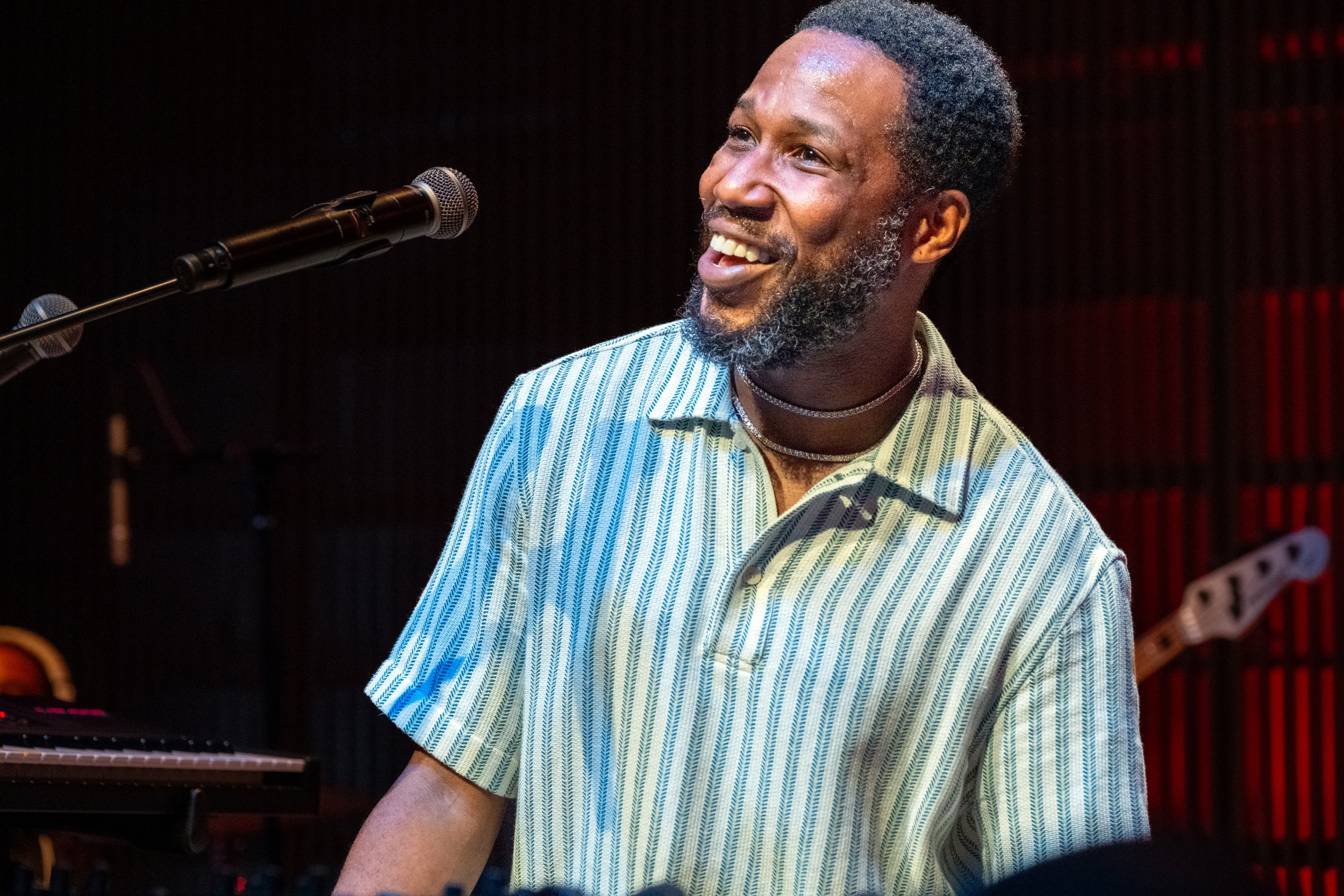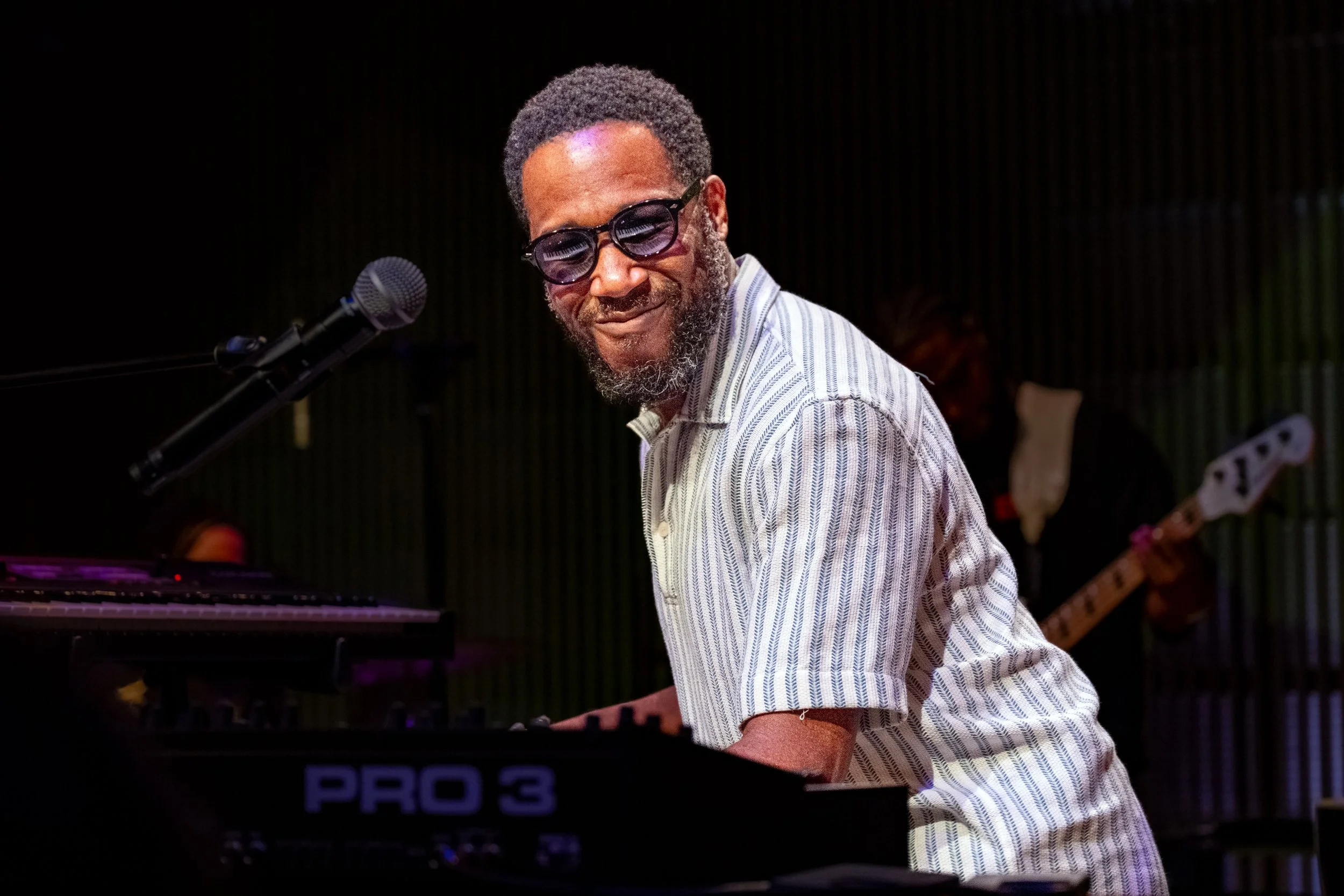Cory Henry and The Funk Apostles at Miner Auditorium
Cory Henry and The Funk Apostles
Miner Auditorium
San Francisco, California
September 5, 2025
SFJAZZ’s digital director, Ross Eustis, started the evening with a brief welcome, highlighting more than 350 shows on the new season’s schedule. The crowd greeted the band with the kind of enthusiasm associated with Cory Henry’s tour reputation: participatory, spiritual, a revival without dogma. Henry mentioned The Funk Apostles hadn’t played together “in over a year.” Still, the exchanges suggested a sense of muscle memory in the band. People sang, people danced, and the call-and-response thread ran from start to finish.
Cory Henry. Photo: Steve Roby
Cory Henry started creating a loop and transforming Miner Auditorium into a lively crowd in seconds. He grinned into a call-and-response—“How many bodies?”—and the room shouted back “Everybody!” as he played five keyboards arranged in an L shape and led the band into a tight first groove. It felt like a fuse being lit: a short opener, a big payoff, and immediate buy-in from the audience.
Context sharpens the picture. Henry’s recent journey has been busy: a PBS documentary about the making of Church, a Grammy this year for Best Roots Gospel Album, and a leader’s catalog that already spans from Operation Funk to the new Divine Time—material he pulled from throughout the night. He is a church-raised virtuoso who rose to prominence with Snarky Puppy and now leads a show that joyfully mixes gospel harmony, R&B hooks, and jazz voicings into an energetic, danceable style.
The Funk Apostles handled that blend efficiently: Nicholas Semrad on keys, Randy Runyon on guitar, Josh Easley on bass, and Taron Lockett on drums. A trio of Apostle Girls—Taneka Samone Duggan, Matia Washington, and Brianna Turner—thickened refrains, responded to Henry’s preacher-style cues, and covered for him when he stepped away from the rig to sing or work the room. They sounded like a band, not a backline.
Apostle Girl. Photo: Steve Roby
One of the night’s most memorable detours happened mid‑set when a loose party vamp suddenly jumped into the Bee Gees’ “Stayin’ Alive.” Henry gave up the lead to the singers, led the crowd in the “Ah‑ah‑ah‑ah” hook, then joined in the refrain of “What the World Needs Now (Is Love, Sweet Love).” It might have seemed like a novelty; instead, the medley came across as a heartfelt love message because the rhythm section kept a simple groove and the arrangement relied on clear, straightforward vocal parts. The second keyboardist, bending notes like a wah‑wah pedal, added a clever texture that kept the dance floor lively.
Energy management was a theme all evening. Henry played a reggae-inspired loop and launched a new crowd‑favorite with the refrain “let’s party like we just got paid,” complete with James Brown slides and quick, preacher-style breaks. Moments later, he shifted to “Let’s Get Lifted,” cut the band on a dime with a shouted “Hold the music!” and turned the audience into a choir before dropping the beat back in. He knows how to ramp up a room—raising intensity, easing it off, then raising it even higher.
The emotional peak came late with “Icarus.” Henry described it as a “church experience,” beginning slowly with choir-like responses, then layering guitar-like timbres as the band swelled underneath him. The final vocal run—part melisma, part shout—landed hard, serving as a reminder that his virtuosity is at the service of testimony rather than showing off. The hall stilled, then responded.
Cory Henry. Photo Steve Roby
Among the features, The Apostles showed a talent for framing. Early in the set, Runyon’s guitar solo prompted one of the first spontaneous mid-song ovations; elsewhere, the rhythm section kept the two-and-four steady while Henry shifted between the Hammond B3 growl, glossy polysynth, and talk-box effects. Many transitions blended one tune into the next so the groove never cooled, a small but important detail in a dance-oriented show.
The vibe never felt unintentional. There were imperfections. A new mid-set song introduced itself with a two-chord organ vamp and lyrics echoing “Walk On By.” The momentum slowed until Runyon’s focused solo reignited everything. A few abrupt endings, following long communal buildups, disrupted the flow rather than closing it. In a room like Miner, which emphasizes music, those small choices are noticeable. Still, the balance of risk to reward favored Henry’s instincts.
His between‑song banter was part confession, part hustle. He joked about streaming economics—“Ever seen a half‑penny on the street?”—and encouraged the crowd to “plug into the stream” of Divine Time, nine, ten, eleven times; he plugged merch with the deadpan line “No CDs. No vinyl. I’m a clothing store.” It was self‑aware and disarming, and it never derailed the pacing.
Henry got fully into revival mode, asking again, “How many bodies?” and then leading a dance-floor surge into “Bound to Lose Control,” complete with call-and-response and a final, prayer-like thanks on his knees. The message was clear and consistent: music is like shared oxygen, and groove is fellowship. If you came curious, you left with melodies in your head and a reason to explore the catalog.
Standout songs included: “Stayin’ Alive”/“What the World Needs Now (Is Love, Sweet Love);” “Icarus;” “Let’s Get Lifted;” “Try Something New;” Stevie Wonder’s “Isn’t She Lovely” interlude; “Rise” refrain; “Bound to Lose Control.”



